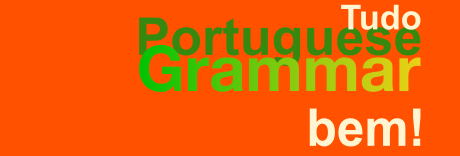
Years of study and practice and I finally know how to say “there”, in Portuguese 🤠. I never thought that something so simple could become so complicated. I’m going to show you this with out the frustrating grammar-talk that most books will throw at you just to learn how to choose the right “there” !
Read more...

using onde | mostrar ➜ to show
Members Only

demonstrative pronouns, portuguese prepositions, slang & expressions, using alí to express “there”
Members Only

adverbs of intensity (degree) | expression: cá | object pronouns (simple) | verb: buscar | verb: sentir
Members Only

Onde in Portuguese is used in several different ways. It’s important to use it with the right prepositions and verbs to get the correct meaning.

Where’s it at? Nowhere to go. Where you from? Where to? ONDE In Portuguese can have these same superpowers. The key to discovering them is in examining real examples in real context.
Read more...

Cá means here (aqui). It’s used in several very common phrases and you can’t simply substitute it for aqui. It’s most often used with para or de. Para cá evolved from venha para aqui. If you say it fast enough you’ll see that it’s just a natural shorthand to say…

You are asking literally: Of where you are?; but the correct translation is of course: Where are you from? De onde você é? & Você é de onde? These two variations are the most common. They mean exactly the same thing. Variations

Cadê is an expression that’s used in everyday speech – all the time! Use it to ask where something or someone is or went to.

Lá in Portuguese is actually used in many different ways in day-today conversation. To Brazilians it’s much more than just, “there”! Let’s look at the most common examples and how “lá” gets incorporated into some of the most iconic Portuguese expressions.
Read more...

The 3 words used to express, there are: aí: where the listener is. ali: within eyesight lá: out of sight

common comparatives | EXPERIMENTAR & PROVAR | the expression: cadê | using para | the preterit tense of verbs SER and IR | ligar ➜ to call, connect
Members Only

using ACABAR with de | expression: cá | the preposition de
Members Only

Brazilians are very curious about foreigners in their country. They will surely ask you: De onde você é? : of where you are (literally speaking).
Read more...

expressing “here & there” | possessive pronouns
Members Only

the expression: de onde você é | using PRECISAR with verbs | precisar ➜ to need
Members Only

future tense – using IR | onde | trabalhar
Members Only

aí ali & lá | começar
Members Only

aí ali & lá | adorar
Members Only

the expression: cadê
Members Only

expression: cá | the expression: pode SER
Members Only

JANICE Pois não senhor. “Pois não” translates to “at your service”. You’ll only hear it in this type of situation – being served. WILLIAM Olá, bom dia. Eu quero uma Coca-Cola. Uma Coca-Cola Zero. JANICE Olá e, seja bem vindo meu amigo. Mas, nós não temos Coca-Cola. WILLIAM Não tem. Sério? Você aqui tem sucos!…
Members Only

expressing “here & there” | contractions dele & dela | contractions naquele, naquela, naquilo | the expression: em falta | indefinite pronouns: uns, vários, certo
Members Only

I’ve written about the expression pode deixar and, me deixa em paz ~ me deixa sozinho (leave me in peace ~ leave me alone)… but the one that keeps coming back is: deixa para lá. Por quê? Why does this one generate the most interest? Deixa para lá. Probably because deixar is one powerful verb….
Read more...

I began my quest for fluency using the Pimsleur Portuguese audio program and had committed to memory this useful phrase: » Come here! Not just useful but this was helping me remember how the Imperative Mood works. So why is this post about Vem cá!? Because you will never hear, Venha aqui in Brazil: everyone…
Read more...

The Present Progressive is one of the easiest conjugations to do. And, seriously useful. This dialog is packed with examples BUT, there are some hard to understand sentences here. That’s because several are spoken really fast, the way Brazilians do. Don’t give up! I will walk you through all of them. CARA Você está vendo…
Members Only

GAROTA Ai, droga! Perdi meu tenîs. “Ai, droga” is like saying “oh, hell”. Droga literally means drug. But I doubt anyone says, “oh, drug!”. I’d guess that the word drug used to mean anything bad. GAROTA Dá licença. “Dá” is the verb dar. This is how Brazilians say, excuse me. They literally say, “give license”….
Members Only

CLAUDIA Aqui tem algum filme do Alfred Hitchcock? Did you hear her say algum filme? She swallowed the algum. HUGO Oi? Não. Aqui são filmes românticos. Os filmes de suspense, eu não sei onde estão. I’m so proud of this line because it contains SER and ESTAR side-by-side — in the plural (they) -! Amazing….
Members Only

TATIANA Te achei! “Te achei” is the short way of saying “Eu te achei.”, which is the short way of saying “Eu achei você.” WILLIAM Oi amor! É. Você me achou, sim. That “é” is just William saying, “it is (me)”. Note the word order here. We wouldn’t say, “you me found”. In Portuguese you…
Members Only
























